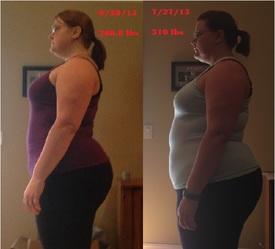eating at a deficit and not losing weight
Options
Replies
-
Yes, technically you should be right janejellyroll but then again there's that theory that says your body enters a starvation mode when it's not taking in enough calories, meaning it's holding on to fat and weight thereof to try and preserve energy. It's one of the many theories, I don't know if it's accurate...0
-
janejellyroll wrote: »PinkPixiexox wrote: »DeguelloTex wrote: »
No, it couldn't.PinkPixiexox wrote: »To break your plateau, I'd suggest increasing your calories from 1200. I'd say a more realistically amount for you would be 1700. If your TDEE is correct, you are eating far too little. This could be the reason for the plateau.
I don't claim to be an expert here you know. I'm offering my 2 cents. If you have a better answer (which I'm sure you probably do) then brilliant. I'm not a weight loss expert - I'm just offering food for thought. *Sigh*
There isn't any reason to think that someone who isn't losing weight will lose weight if they begin taking in more energy. This runs against everything we know about how energy is used and stored by the body -- weight loss is caused by a deficit. If someone isn't in a deficit, eating more isn't going to generate weight loss.
Well fair enough - there have been conflicting points on that so I can understand people's confusion. I'm not an expert - just trying to help if I can. Apologies OP for giving you incorrect advice - I stopped losing after 4 months on 1200 calories. After boosting them to 1500 and changing my exercise a little, it started dropping significantly again. Who knows what happened!0 -
If you just started adding carbs back into your diet after being on Keto, could your body be holding onto more water than usual? Though after a month you would think it would even out... I would bet the people that say tighten up your logging are correct.0
-
Yes, technically you should be right janejellyroll but then again there's that theory that says your body enters a starvation mode when it's not taking in enough calories, meaning it's holding on to fat and weight thereof to try and preserve energy. It's one of the many theories, I don't know if it's accurate...
No, it isn't very accurate -- especially the way it is thrown around in weight loss conversations.
Think about it: if one couldn't lose weight on a very low calorie diet, then how could anyone ever starve to death? People lose weight when they are in a deficit -- even if their metabolism has slowed down (in the case of an extreme, long-term restriction). If you aren't losing weight, you aren't in a deficit. Eating more won't reverse this.
What is likely happening here is a logging issue (that is, consuming more than you think you are).0 -
Yes, technically you should be right janejellyroll but then again there's that theory that says your body enters a starvation mode when it's not taking in enough calories, meaning it's holding on to fat and weight thereof to try and preserve energy. It's one of the many theories, I don't know if it's accurate...
Starvation mode, in the way that you described it, does not exist.
There are people who have a very high deficit and plateau and then start losing once they start eating more and/or exercising less. During the plateau, they are still losing fat but their increased cortisol levels, which are due to the amount of stress the body is under while dieting at the high deficit, cause water retention. This is pretty established stuff and often ignored in threads like these. It is absolutely possible to fail to lose weight while in a deficit. It is not possible to fail to lose fat (or muscle), but weight? Yes. I'm not saying that's what's happening here (not enough info to know for sure) but it is a possibility.
Water retention
* http://www.leangains.com/2010/01/how-to-deal-with-water-retention-part.html
* http://www.leangains.com/2010/01/how-to-deal-with-water-retention-part_28.html
* http://www.bodyrecomposition.com/fat-loss/why-big-caloric-deficits-and-lots-of-activity-can-hurt-fat-loss.html/0 -
Yes, technically you should be right janejellyroll but then again there's that theory that says your body enters a starvation mode when it's not taking in enough calories, meaning it's holding on to fat and weight thereof to try and preserve energy. It's one of the many theories, I don't know if it's accurate...
Starvation mode, in the way that you described it, does not exist.
There are people who have a very high deficit and plateau and then start losing once they start eating more and/or exercising less. During the plateau, they are still losing fat but their increased cortisol levels, which are due to the amount of stress the body is under while dieting at the high deficit, cause water retention. This is pretty established stuff and often ignored in threads like these. It is absolutely possible to fail to lose weight while in a deficit. It is not possible to fail to lose fat (or muscle), but weight? Yes. I'm not saying that's what's happening here (not enough info to know for sure) but it is a possibility.
Water retention
* http://www.leangains.com/2010/01/how-to-deal-with-water-retention-part.html
* http://www.leangains.com/2010/01/how-to-deal-with-water-retention-part_28.html
* http://www.bodyrecomposition.com/fat-loss/why-big-caloric-deficits-and-lots-of-activity-can-hurt-fat-loss.html/
So I wasn't being 'stupid' with my advice? Not as such.
0 -
Yes, technically you should be right janejellyroll but then again there's that theory that says your body enters a starvation mode when it's not taking in enough calories, meaning it's holding on to fat and weight thereof to try and preserve energy. It's one of the many theories, I don't know if it's accurate...
Starvation mode, in the way that you described it, does not exist.
There are people who have a very high deficit and plateau and then start losing once they start eating more and/or exercising less. During the plateau, they are still losing fat but their increased cortisol levels, which are due to the amount of stress the body is under while dieting at the high deficit, cause water retention. This is pretty established stuff and often ignored in threads like these. It is absolutely possible to fail to lose weight while in a deficit. It is not possible to fail to lose fat (or muscle), but weight? Yes. I'm not saying that's what's happening here (not enough info to know for sure) but it is a possibility.
Water retention
* http://www.leangains.com/2010/01/how-to-deal-with-water-retention-part.html
* http://www.leangains.com/2010/01/how-to-deal-with-water-retention-part_28.html
* http://www.bodyrecomposition.com/fat-loss/why-big-caloric-deficits-and-lots-of-activity-can-hurt-fat-loss.html/
Actually this makes sense, thank you for the intel! I did notice a much higher water retention lately and didn't know how to explain it
0 -
That doesn't mean she shouldn't try to eat more and restructure her loss expectations, especially if she'd not feeling well on what she's eating. If she eats more she can take the loss more slowly and probably put even more into her workouts. (Also, the way she phrased this, it doesn't sound like she's eating back exercise calories at all, so whether her burn number is off or not doesn't matter).
If she is not losing now, and she eats more, she will gain weight. Might feel better, but right now she's in maintenance mode, and so eating more with no other changes will result in weight gain.
0 -
Setting a higher calorie goal will usually make adherence easier and prevent "cheating", but as nobody wants to admit to cheating, it's more convenient to think that you "eat more to lose more" and that "starvation mode" makes the body "wants to hold on to fat". It may very well work, but the conceptions are still *kitten*.0
Categories
- All Categories
- 1.4M Health, Wellness and Goals
- 392.1K Introduce Yourself
- 43.6K Getting Started
- 259.9K Health and Weight Loss
- 175.7K Food and Nutrition
- 47.4K Recipes
- 232.4K Fitness and Exercise
- 403 Sleep, Mindfulness and Overall Wellness
- 6.4K Goal: Maintaining Weight
- 8.5K Goal: Gaining Weight and Body Building
- 152.8K Motivation and Support
- 7.9K Challenges
- 1.3K Debate Club
- 96.3K Chit-Chat
- 2.5K Fun and Games
- 3.4K MyFitnessPal Information
- 23 News and Announcements
- 983 Feature Suggestions and Ideas
- 2.4K MyFitnessPal Tech Support Questions





